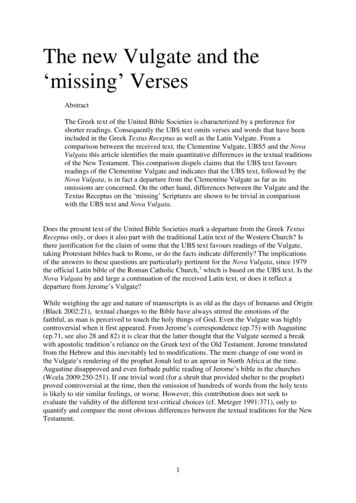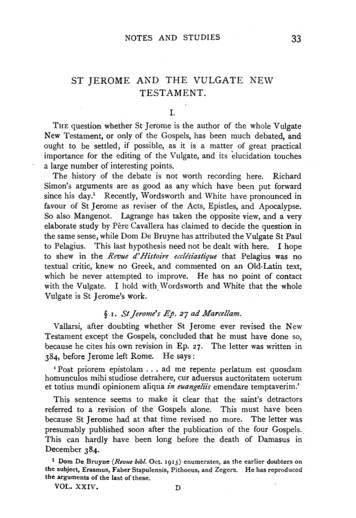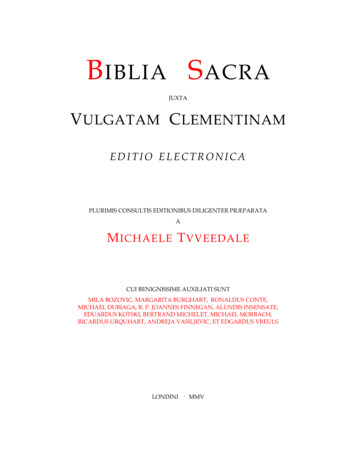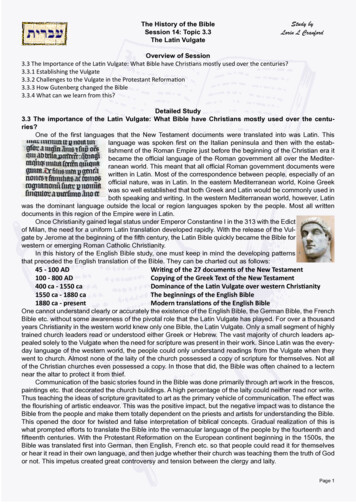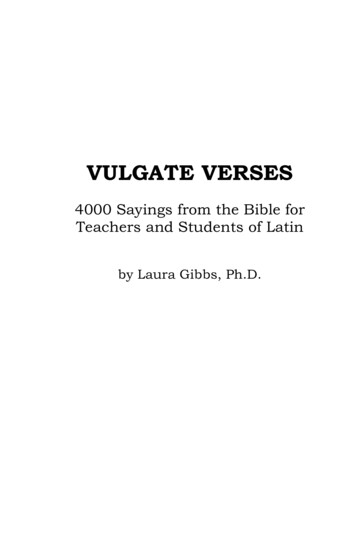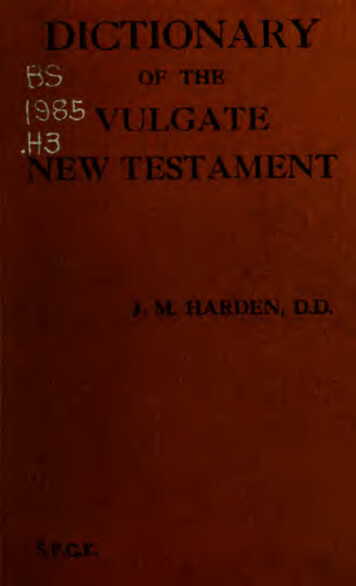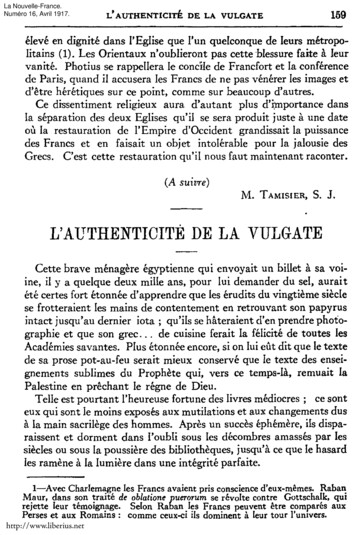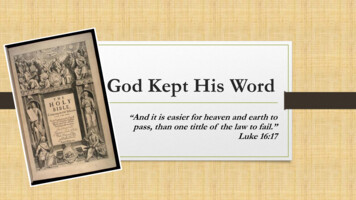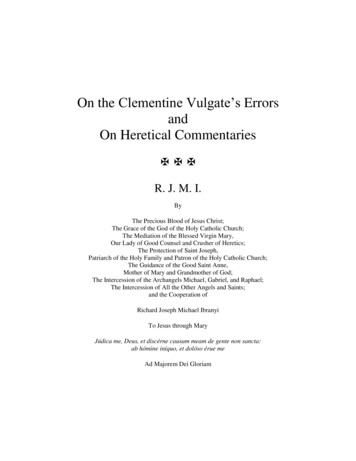
Transcription
On the Clementine Vulgate’s ErrorsandOn Heretical Commentaries R. J. M. I.ByThe Precious Blood of Jesus Christ;The Grace of the God of the Holy Catholic Church;The Mediation of the Blessed Virgin Mary,Our Lady of Good Counsel and Crusher of Heretics;The Protection of Saint Joseph,Patriarch of the Holy Family and Patron of the Holy Catholic Church;The Guidance of the Good Saint Anne,Mother of Mary and Grandmother of God;The Intercession of the Archangels Michael, Gabriel, and Raphael;The Intercession of All the Other Angels and Saints;and the Cooperation ofRichard Joseph Michael IbranyiTo Jesus through MaryJúdica me, Deus, et discérne causam meam de gente non sancta:ab hómine iníquo, et dolóso érue meAd Majorem Dei Gloriam
2
“The authority of the Septuagint is pre-eminentas far as the Old Testament is concerned.”(St. Augustine, On Christian Doctrine)Original version: 3/2020; Current version: 10/2020Mary’s Little Remnant302 East Joffre St.Truth or Consequences, New Mexico 87901-2878, USAWebsite: www.JohnTheBaptist.us(Send for a free catalog)3
4
TABLE OF CONTENTSINTRODUCTION . 7On the Haydock Bible . 7ON THE HERESIES AND OTHER ERRORS IN THE CLEMENTINE VULGATE. 9ON HERESIES AND OTHER ERRORS IN COMMENTARIES THAT TRY TO EXPLAIN ERRONEOUS TEXTS. 28SOME OF THE HERESIES AND OTHER ERRORS IN THE CLEMENTINE VULGATE . 28The heresy that Isaac was Abraham’s only-begotten son . 29The heresy that the Southern Kingdom of Juda consisted of one tribe instead of two . 30An erroneous commentary on the erroneous text. 32The heresy that life does not begin in the womb . 32The heresy that the Paschal sacrifice was a lamb and a goat . 33A heretical commentary on the heretical text . 33The heresy and blasphemy that has God profaning men . 34An erroneous commentary that explains away the heresy and blasphemy. 34The idolatry that faithful Jews allowed pagans to worship with them . 34An erroneous commentary that explains away the idolatrous and blasphemous text . 35The heresy and blasphemy that God is perverted. 35A heretical commentary that accepts the heretical and blasphemous text . 35The heresy that God repented and thus had sinned . 36A heretical commentary on the heretical text . 36The heresy that after King Saul died he went to the same place as Samuel . 36Erroneous commentaries on the heretical text . 37The heresy and blasphemy that replaces curses with blessings . 37An erroneous commentary on the heretical and blasphemous texts . 38The heresy that all wars are unjust . 39An erroneous commentary that explains away the heretical text . 39The heresy that a holy prophet does not know the wisdom of God . 40The heresy that Samuel was an Ephraimite . 40The contradiction that the Levite Joseph was also a Gentile . 41Alexandria did not exist in the days of Jeremias, Ezechiel, and Nahum. 41Commentaries give the correct name but leave the incorrect one in the text . 42Both the heart and the liver, not the heart or the liver . 42The commentary mentions the true text but does not address the error in the Clementine Vulgate . 43Imposed a tribute on the land instead of condemned the land . 44Not any king removes evil but a righteous king . 44Doctrine of baptism not of baptisms . 44Can be taken to heretically mean that the faithful must not pray for certain sinners . 45Says that sin is an inconvenience and thus implies it is not sin . 45Elders not senators . 46From Caesarea to Antioch and not to Jerusalem . 46Some verses that make no sense . 46HERETICAL OR OTHERWISE ERRONEOUS TEXTS NOT BASED ON THE CLEMENTINE VULGATE . 48The idolatry of worshipping angels and men . 49Challoner’s idolatrous translation of Josue 5:15 has men worshipping angels . 49Challoner’s idolatrous translation of Genesis 27:29 has men worshipping men. 50The idolatry that God does not hold idolaters guilty (Acts 17:30) . 50The heresy that men are saved by following their own conscience (1 Cor. 4:4) . 51The heresy and blasphemy that Jesus was a malefactor (Lk. 23:32) . 51Slaves not servants . 52Repentance not penance . 53MORE HERETICAL OR OTHERWISE ERRONEOUS BIBLICAL COMMENTARIES . 555
Introduction . 55Evidence . 55The heresy of respecting and condoning false religions. 55The stoic heresy . 55The stoic-influenced error that Abisag was David’s wife . 56The heresy that slavery is intrinsically evil . 56The heresy that denies the power of the Devil . 57The heresy that anger is intrinsically evil . 57Implies that Jesus and Mary sinned . 57The error that non-sinful falsehoods are sinful . 58The heresy that denies dreams from God . 61The heresy that the sodomites killed in Sodom will not be condemned to hell . 61The heresy of heliocentrism . 61The heresy that there is no pain after death for the damned . 62The heresy that denies the Salvation Dogma . 62Heresies regarding the Old and New Testament eras . 63The heresy that idolatry was tolerated among the faithful during the Old Testament era . 67The idolatry of glorifying mythology or philosophy . 67The heresies of non-judgmentalism and non-punishmentalism . 69Condemns justified rebukes (1 Tim. 5:1) . 69Condemns righteous anger (Ja. 1:19-20) . 69Excuses idolatry (3 Ki. 12:28) . 70Denies a dogma on excommunications (2 Cor. 10:8) . 70Condemns justified punishments and incites rebellion (Est. 1:19-21). 71Condemns killings executed by religious (3 Ki. 19:17) . 72Condemns justified killings and torture . 72Condemns justified revenge . 79The doubt or denial of miraculous events . 83The heresy that God does not attend to the petitions of the innocent . 85The heresy that denies the temporal Kingship of Christ . 85The heresy that all sins proceed from ignorance . 86The heresy that idolatry is not idolatry or wicked but only a weakness . 87The glorification of heretics . 87The heresies that polygamy and divorce are intrinsically evil . 88VERSIONS OF THE SEPTUAGINT . 88THE CATHOLIC FAITH IS NOT DIMINISHED JUST BECAUSE NO PURE VERSION OF THE BIBLE EXISTS . 90I AM WORKING ON PRODUCING THE PUREST POSSIBLE VERSION OF THE CATHOLIC BIBLE . 906
IntroductionOn the Haydock BibleThe apostate Bishop George Haydock is the author of the Haydock Bible which was publishedin 1859.Haydock’s Catholic Family Bible and Commentary, by the apostate Bishop Fr.George Leo Haydock, 1859. Published by Edward Dunigan and Brother, New York,NY. Approved by many bishops.The Haydock Bible contains commentaries from Haydock himself and others. Many of thecommentaries contain contradictions and heretical probabilism in which he presents dogmas notas dogmas and the heresies that oppose them not as heresies. Instead he presents them asallowable opinions and leaves the reader to decide which one is true.1In the beginning of his Bible, Haydock lists all the commentators and identifies most of theheretical commentators and thus warns the reader, which justifies his use of them withoutscandalizing the readers. However, he culpably refers to some heretical commentators asorthodox and thus not as heretics, such as Origen; and hence Haydock is a formal heretic on thispoint alone.He lists Origen 89 times in the Old Testament and 64 times in the New Testament and doesnot once refer to Origen as a heretic, which would be acceptable if he had listed Origen as aheretic in a prominent place in the work. What is worse is that he lists Origen as orthodox instead.In the “Preface” of his Bible in the section titled “A List of the Principal Commentators, &c,” helists all the commentators he quotes in his Bible and says that the ones with a cross next to theirnames are not Catholic. For example, Martin Luther and Calvin have a cross next to their names;but the apostates Origen and Clement of Alexandria and Eusebius do not, and thus he refers to thethree of them as orthodox and thus Catholic:Heretical Haydock Bible, by apostate Bishop George Haydock, 1859: “Preface, AList of the Principal Commentators, &c.: Those who have a Cross prefixed to theirNames, have been perhaps Men of Learning, but they have erred from the Faithwhich was once delivered to the Saints, and can therefore be consulted only asCritics, or to be refuted Calvin; Clem. Alex; Eusebius; Luther; Origen.”1See RJMI book The Hellenization of Christianity by the Anti-Church Fathers and Scholastics: Heretical Probabilism.7
The initials and names of the commentators from the Haydock Bible quoted in this book are asfollows: B. is Bristow; C. is Calmet; Ch. is Challoner; D. is Du Hamel; E. is Estius; H.is Haydock; J. is Jansenius; M. is Menochius; P. is Pastorini; Po. is Polus; T. isTirinus; V. is Bible de Vence; W. is Worthington; Wi. is Witham.Whenever I say “Haydock” or “Haydock commentary” in this book, I mean commentaries inhis Bible but not necessarily his commentaries. Because he put commentaries in his Bible that arenot his, he takes responsibility for them.8
On the Heresies and Other Errors in the Clementine VulgateFar from being infallible, the Clementine Vulgate’s Old Testament contains many errors,contradictions, inconsistencies, and even contains some heresies. While the Clementine Vulgate’sNew Testament also contains textual errors, it does not contain heretical errors and contains onlya few errors in comparison to the many errors in the Old Testament.During the time of Christ’s first coming, the Septuagint (also known as “The Seventy” or“LXX”) was an authentic Old Testament which was used by Jesus Christ, his Apostles anddisciples, and the Church Fathers. It is a miraculous Greek translation of the Hebrew OldTestament that took place in Egypt around 280 BC:Flavius Josephus (AD 37-c. 101), Antiquities of the Jews, 1st century: “1. WHENAlexander had reigned twelve years, and after him Ptolemy Soter forty years,Philadelphus then took the kingdom of Egypt, and held it forty years within one. Heprocured the law to be interpreted, and set free those that were come from Jerusaleminto Egypt and were in slavery there, who were a hundred and twenty thousand. Theoccasion was this: Demetrius Phalerius, who was library keeper to the king, wasnow endeavoring, if it were possible, to gather together all the books that were inthe habitable earth, and buying whatsoever was any where valuable or agreeable tothe king’s inclination, (who was very earnestly set upon collecting of books,) towhich inclination of his Demetrius was zealously subservient. And when oncePtolemy asked him how many ten thousands of books he had collected, he repliedthat he had already about twenty times ten thousand; but that, in a little time, heshould have fifty times ten thousand. But be said he had been informed that therewere many books of laws among the Jews worthy of inquiring after, and worthy ofthe king’s library, but which, being written in characters and in a dialect of theirown, will cause no small pains in getting them translated into the Greek tongue; thatthe character in which they are written seems to be like to that which is the propercharacter of the Syrians, and that its sound, when pronounced, is like theirs also;and that this sound appears to be peculiar to themselves. Wherefore he said thatnothing hindered why they might not get those books to be translated also; for whilenothing is wanting that is necessary for that purpose, we may have their books alsoin this library. So the king thought that Demetrius was very zealous to procure himabundance of books, and that he suggested what was exceeding proper for him todo; and therefore he wrote to the Jewish high priest that he should act accordingly.“2. Now there was one Aristeus, who was among the king’s most intimatefriends, and on account of his modesty very acceptable to him “3. When Aristeus was saying thus, the king looked upon him with a cheerful andjoyful countenance, and said, ‘How many ten thousands dost thou suppose there areof such as want to be made free?’ To which Andreas replied, as he stood by, andsaid, ‘A few more than ten times ten thousand.’ The king made answer, ‘And is thisa small gift that thou askest, Aristeus?’ But Sosibius, and the rest that stood by, saidthat he ought to offer such a thank-offering as was worthy of his greatness of soul,to that God who had given him his kingdom. With this answer he was muchpleased; and gave order, that when they paid the soldiers their wages, they shouldlay down [a hundred and] twenty drachmas for every one of the slaves. “4. Now when this had been done after so magnificent a manner, according to theking’s inclinations, he gave order to Demetrius to give him in writing his sentimentsconcerning the transcribing of the Jewish books; for no part of the administration isdone rashly by these kings, but all things are managed with great circumspection.On which account I have subjoined a copy of these epistles, and set down themultitude of the vessels sent as gifts [to Jerusalem], and the construction of everyone, that the exactness of the artificers’ workmanship, as it appeared to those thatsaw them, and which workmen made every vessel, may be made manifest, and this
on account of the excellency of the vessels themselves. Now the copy of the epistlewas to this purpose:‘Demetrius to the great king. When thou, O king, gavest me a chargeconcerning the collection of books that were wanting to fill your library, andconcerning the care that ought to be taken about such as are imperfect, I haveused the utmost diligence about those matters. And I let you know, that we wantthe books of the Jewish legislation, with some others; for they are written in theHebrew characters, and being in the language of that nation, are to us unknown.It hath also happened to them, that they have been transcribed more carelesslythan they ought to have been, because they have not had hitherto royal caretaken about them. Now it is necessary that thou shouldst have accurate copies ofthem. And indeed this legislation is full of hidden wisdom, and entirelyblameless, as being the legislation of God; for which cause it is, as Hecateus ofAbdera says, that the poets and historians make no mention of it, nor of thosemen who lead their lives according to it, since it is a holy law, and ought not tobe published by profane mouths. If then it please thee, O king, thou mayst writeto the high priest of the Jews to send six of the elders out of every tribe, andthose such as are most skillful of the laws, that by their means we may learn theclear and agreeing sense of these books, and may obtain an accurateinterpretation of their contents, and so may have such a collection of these asmay be suitable to thy desire.’“5. When this epistle was sent to the king, he commanded that an epistle shouldbe drawn up for Eleazar, the Jewish high priest, concerning these matters; and thatthey should inform him of the release of the Jews that had been in slavery amongthem “6. When this epistle of the king was brought to Eleazar, he wrote an answer to itwith all the respect possible:‘Eleazar the high priest to king Ptolemy, sendeth greeting. If thou and thy queenArsinoe, and thy children, be well, we are entirely satisfied. When we receivedthy epistle, we greatly rejoiced at thy intentions; and when the multitude weregathered together, we read it to them and thereby made them sensible of thepiety thou hast towards God. We also showed them the twenty vials of gold, andthirty of silver, and the five large basons, and the table for the shew-bread; asalso the hundred talents for the sacrifices, and for the making what shall beneedful at the temple; which things Andreas and Aristeus, those most honoredfriends of thine, have brought us; and truly they are persons of an excellentcharacter, and of great learning, and worthy of thy virtue. Know then that wewill gratify thee in what is for thy advantage, though we do what we used not todo before; for we ought to make a return for the numerous acts of kindnesswhich thou hast done to our countrymen. We immediately, therefore, offeredsacrifices for thee and thy sister, with thy children and friends; and themultitude made prayers, that thy affairs may be to thy mind, and that thykingdom may be preserved in peace, and that the translation of our law maycome to the conclusion thou desirest and be for thy advantage. We have alsochosen six elders out of every tribe, whom we have sent, and the law with them.It will be thy part, out of thy piety and justice, to send back the law, when ithath been translated, and to return those to us that bring it in safety. Farewell.’“7. This was the reply which the high priest made. But it does not seem to me tobe necessary to set down the names of the seventy [two] elders who were sent byEleazar, and carried the law, which yet were subjoined at the end of the epistle “11. And when they were come to Alexandria, and Ptolemy heard that theywere come, and that the seventy [two] elders were come also, he presently sent forAndreas and Aristeus, his ambassadors, who came to him, and delivered him theepistle which they brought him from the high priest, and made answer to all the10
questions he put to them by word of mouth. He then made haste to meet the eldersthat came from Jerusalem for the interpretation of the laws “13. And when they had gone over the bridge, he proceeded to the northernparts, and showed them where they should meet, which was in a house that wasbuilt near the shore, and was a quiet place, and fit for their discoursing togetherabout their work. When he had brought them thither, he entreated them (now theyhad all things about them which they wanted for the interpretation of their law) thatthey would suffer nothing to interrupt them in their work. Accordingly, they madean accurate interpretation, with great zeal and great pains, and this they continued todo till the ninth hour of the day; after which time they relaxed, and took care of theirbody, while their food was provided for them in great plenty “Now when the law was transcribed, and the labor of interpretation was over,which came to its conclusion in seventy-two days, Demetrius gathered all the Jewstogether to the place where the laws were translated, and where the interpreterswere, and read them over. The multitude did also approve of those elders that werethe interpreters of the law.“They withal commended Demetrius for his proposal, as the inventor of whatwas greatly for their happiness; and they desired that he would give leave to theirrulers also to read the law. Moreover, they all, both the priest and the ancientest ofthe elders, and the principal men of their commonwealth, made it their request thatsince the interpretation was happily finished it might continue in the state it nowwas and might not be altered. And when they all commended that determination oftheirs, they enjoined that if any one observed either any thing superfluous, or anything omitted, that he would take a view of it again and have it laid before them andcorrected; which was a wise action of theirs, that when the thing was judged to havebeen well done, it might continue for ever.“14. So the king rejoiced when he saw that his design of this nature was broughtto perfection, to so great advantage; and he was chiefly delighted with hearing thelaws read to him; and was astonished at the deep meaning and wisdom of thelegislator. And he began to discourse with Demetrius, ‘How it came to pass, thatwhen this legislation was so wonderful, no one, either of the poets or of thehistorians, had made mention of it.’ Demetrius made answer, ‘that no one durst beso bold as to touch upon the description of these laws, because they were Divineand venerable, and because some that had attempted it were afflicted by God.’ Healso told him that ‘Theopompus was desirous of writing somewhat about them, butwas thereupon disturbed in his mind for above thirty days’ time; and upon someintermission of his distemper, he appeased God [by prayer], as suspecting that hismadness proceeded from that cause.’ Nay, indeed, he further saw in a dream, thathis distemper befell him while he indulged too great a curiosity about Divinematters, and was desirous of publishing them among common men; but when he leftoff that attempt, he recovered his understanding again. Moreover, he informed himof Theodectes, the tragic poet, concerning whom it was reported, that when in acertain dramatic representation he was desirous to make mention of things that werecontained in the sacred books, he was afflicted with a darkness in his eyes; and thatupon his being conscious of the occasion of his distemper, and appeasing God [byprayer], he was freed from that affliction.“15. And when the king had received these books from Demetrius, as we havesaid already, he adored them, and gave order that great care should be taken ofthem, that they might remain uncorrupted.”2Apostate Justin Martyr, Hortatory Address to the Greeks, 2nd century: “But if anyone says that the writings of Moses and of the rest of the prophets were also writtenin the Greek character, let him read profane histories, and know that Ptolemy, king2b. 12, c. 2, How Ptolemy Philadelphus procured the laws of the Jews to be translated into the Greek tongue, and set many captivesfree, and dedicated many gifts to God.11
of Egypt, when he had built the library in Alexandria, and by gathering books fromevery quarter had filled it, then learnt that very ancient histories written in Hebrewhappened to be carefully preserved; and wishing to know their contents, he sent forseventy wise men from Jerusalem, who were acquainted with both the Greek andHebrew language, and appointed them to translate the books; and that in freedomfrom all disturbance they might the more speedily complete the translation, heordered that there should be constructed, not in the city itself, but seven stadia off(where the Pharos was built), as many little cots as there were translators, so thateach by himself might complete his own translation; and enjoined upon thoseofficers who were appointed to this duty, to afford them all attendance, but toprevent communication with one another, in order that the accuracy of thetranslation might be discernible even by their agreement. And when he ascertainedthat the seventy men had not only given the same meaning, but had employed thesame words, and had failed in agreement with one another not even to the extent ofone word, but had written the same things and concerning the same things, he wasstruck with amazement, and believed that the translation had been written by divinepower, and perceived that the men were worthy of all honour, as beloved of God,and with many gifts ordered them to return to their own country. And having, aswas natural, marvelled at the books, and concluded them to be divine, heconsecrated them in that library. These things, ye men of Greece, are no fable, nordo we narrate fictions; but we ourselves having been in Alexandria, saw the remainsof the little cots at the Pharos still preserved, and having heard these things from theinhabitants, who had received them as part of their country’s tradition, we now tellto you what you can also learn from others, and specially from those wise andesteemed men who have written of these things, Philo and Josephus, and manyothers.”3St. Irenaeus, Against Heresies, c. 18
On the Heresies and Other Errors in the Clementine Vulgate Far from being infallible, the Clementine Vulgate’s Old Testament contains many errors, contradictions, inconsistencies, and even contains some heresies. While the Clementine Vulgate’s New Testament also contains textual error
